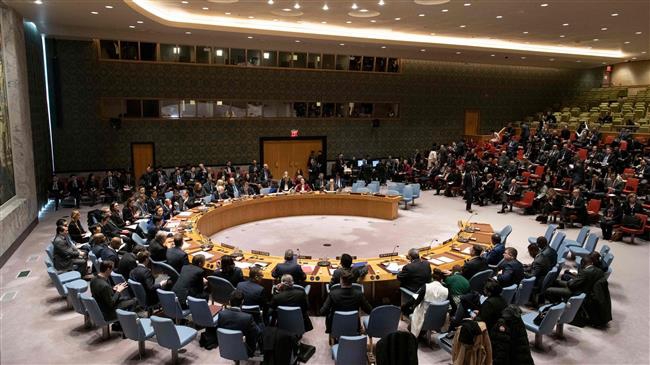Friday 10 January 2020 - 23:21
Story Code : 367735
US comes under fire at UN Security Council meeting for assassinating Gen. Soleimani
The Thursday meeting, originally called to discuss the UN Charter, morphed into an hours-long debate featuring several member nations who blasted the administration of Donald Trump for escalating tensions in the Middle East.
Chinese Ambassador Zhang Jun said �at present the United States� unilateral military adventurism has led to the tensing�of the situation in the Middle East Persian�Gulf region.�
UN Secretary-General Antonio Guterres also criticized �miscalculations� and warned against moves that would bring the region into another conflict. �War is never inevitable; it is a matter of choice, and often it is a product of easy miscalculations.�
Syrian Ambassador Bashar Jaafari criticized the Security Council�s silence toward the US�assassination of General Soleimani.
�How is the council silent vis-a-vis the US�assassination crime against Iranian and Iraqi leaders that were fighting ISIS [Daesh] and Nusra Front in Syria and Iraq?� he asked.
The US ambassador, however, defended his country�s dangerous move, repeating the claim that it was a move to prevent an �imminent threat�, without providing any evidence.
�This decision was not taken lightly,� US Ambassador Kelly Craft said at the UN. She tried to justify the assassination by stating that Iran had�been �threatening� the lives of Americans for years.
US President Donald Trump has said he personally ordered the assassination of Gen. Soleimani and�Abu Mahdi al-Muhandis, the second-in-command of Iraq�s Popular Mobilization Units (PMU), in a drone strike in Baghdad last Friday.
General Soleimani�cooperated closely with the PMU and other�counter-terrorism groups against the most brutal of the terrorist outfits, including Daesh.
On Wednesday, Iran pounded two US military bases in Iraq with its precision-guided missiles in a retaliation which�Leader of the Islamic Revolution Ayatollah Seyyed Ali Khamenei described a "slap on the face" of the Americans.
Commander of the Aerospace Division of IRGC has said the strikes on the Ain al-Assad airbase and another base in Erbil were only �the starting point of a great operation,� which would encompass the entire region if the American provocation continued.
Brigadier General Amir-Ali Hajizadeh said the retaliation targeted one of the most important of America�s outposts. �The strikes were not meant to cause fatalities. We intended to deliver a blow to the enemy�s military machine."
prev
next
Latest News
Most viewed











